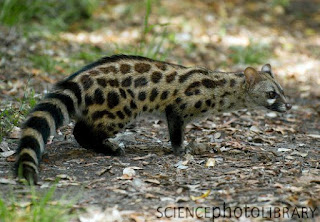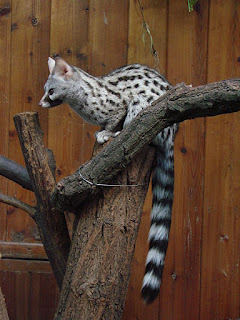They are very agile creatures, and have the unusual ability to stand bipedally. They are nocturnal, solitary animals, although some pairs and family groups are seen occasionally. Genets prefer to live in areas with dense vegetation, high temperatures and low rainfall. They are generally considered to be omnivorous, although they prefer animal matter. The genet can arch its back and groom itself in much the same way as a domestic cat. It also hisses, purrs, spits and meows, but makes a unique "churring" sound when distressed.
Several species of Genet, including the Common Genet and the Large Spotted Genet, are being kept as pets. They have been compared to kittens or domestic ferrets in temperament, and can eat cat or ferret food. They also can be litter-box trained.
The Small Spotted Genet and the Large Spotted Genet are the species of Genet that live in South Africa.
 |
| South African Large-Spotten Genet |
 |
| Genet Kitten |
Because I included genetics in the title, I might as well through in a genetic fact. So I'll talk a little about King Cheetahs. The King Cheetah was once actually thought to be a separate sub-species, but it is no longer considered as such. Rather, a recessive gene must be inherited from both parents for this distinctive coat pattern to be expressed. The De Wildt Cheetah Center was the first center to breed a king cheetah from two normal cheetahs, proving that the King Cheetah is a genetically true cheetah with only a different coat pattern. King Cheetahs are incredibly rare, with only about 10 thought to be living in the wild.


No comments:
Post a Comment